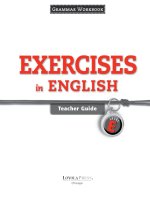grammar PRONOUNS in english
Bạn đang xem bản rút gọn của tài liệu. Xem và tải ngay bản đầy đủ của tài liệu tại đây (80.32 KB, 8 trang )
pronouns
Personal Pronouns are a subset of pronouns
which stand in for people, places, things and ideas.
Personal Pronouns
• When we replace proper nouns, we use personal pronouns:
• Alice looked at Alice's reflection in the mirror before
washing Alice.
• She looked at her reflection in the mirror before washing
herself.
OBJECT PRONOUNS
When we replace object of a sentence, we use object
pronouns.
(me / you/ her/ him / it / us , you them)
• Alice looked at the cat. Alice looked at it.
• John is looking for Mary. John is looking for
her.
• William took the ball and then he kicked it.
Possessive Adjectives
We use possessive adjectives with nouns to show
possession or ownership.
There are seven possessive adjectives in the English
language:
• my (sth. belongs to me - I own it)
• your (sth. belongs to you (singular) - you own it)
• his (sth. belongs to him - he owns it)
• her (sth. belongs to her - she owns it)
• its (sth. belongs to it - it owns it)
• our (sth. belongs to us - we own it)
• your (sth. belongs to your (plural) - you own it)
• their (sth. belongs to them - they own it)
• Her hair is beautiful
• I like her smile.
Possessive Pronouns
• Possessive pronouns are pronouns used to show ownership.
They tell us who owns what.
• mine (sth. belongs to me - I own it)
• yours (sth. belongs to you (singular) - you own it)
• his (sth. belongs to him - he owns it)
• hers (sth. belongs to her - she owns it)
• its (sth. belongs to it - it owns it)
• ours (sth. belongs to us - we own it)
• yours (sth. belongs to your (plural) - you own it)
• theirs (sth. belongs to them - they own it)
• As with all pronouns, possessive pronouns replace a noun (the
word pronoun comes from Latin and means in place of a noun).
In fact, pronouns are used to avoid repetition.
• This is my bag. That’s hers.
Reflexive Pronouns
• A reflexive pronoun is a special kind of
pronoun used to talk about the same person
or thing that was mentioned in the subject:
• Alice looked at herself in the mirror.
• They enjoyed themselves at the beach.
• We use reflexive pronouns when the person
who does something, and the person who has
something done, are the same.
Note the difference between:
• They looked at each other.
• They looked at themselves.
In the first example, each person looked at the other
people;
In the second example the each person looked only
at himself or herself.
These are some examples of the reflexive use:
• I hope you enjoy yourself on holiday.
• Can I have a biscuit, please? - Go on, help
yourself.
• I'm going out now, children, so behave
yourselves.
• We use reflexive pronouns to give emphasis
to the subject, to stress that the subject
worked alone.
• I did all this work myself.
• She designed all the decorations herself.









